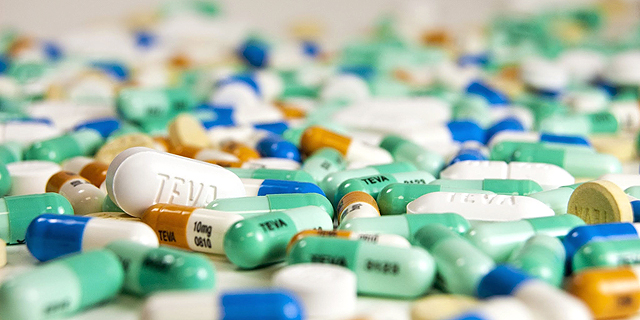
Teva to Repay Due Loans with Junk Bond Private Offering
The debt-laden generic drugmaker is offering around $3.5 billion in senior notes in both dollar and euro denominations
Lilach Baumer | 10:07, 01.03.18
Teva Pharmaceutical Industries Ltd. is looking to repay some of its outstanding debt with a private offering of senior notes, the company announced Wednesday. Through two of its Netherland-based finance subsidiaries, Teva is offering 1 billion euros worth of euro-denominated notes, and $2.25 billion worth of U.S. dollar-denominated notes.
For daily updates, subscribe to our newsletter by clicking here.
The offering is intended to cover Teva's $1.5 billion outstanding debt due July, and around $2.3 billion outstanding debt under its U.S. dollar and Japanese yen term loan agreements, the company said in a statement. As Teva's corporate credit rating is below investment grade, Teva will have to carry higher interest rates on its new notes to compensate for the higher risk of default. Moody's Investors Service, which downgraded Teva to junk bonds in January, has assigned a Ba2 rating to both offerings, with a stable outlook. "Combined with anticipated cash from its recent settlement with Allergan, proceeds from Teva's notes offering will materially reduce its debt maturities in 2018 and 2019, improving its financial flexibility," Moody's Assistant Vice President Morris Borenstein said in a statement Wednesday. Teva is currently struggling to haul around $32 billion in debt, mainly as a result of its inopportune acquisition of Allergan's generic unit Actavis for $40.5 billion in late 2016, when the U.S. generics market was already starting to face its current difficulties. Dwindling revenues and the loss of Teva's patents for its multiple sclerosis drug Copaxone diminished Teva's profit margins, forcing the company to repeatedly lower its financial outlook, sending its stock crashing to a 15-year low. In December, newly appointed CEO Kåre Schultz announced an aggressive reorganization plan that set stabilizing the company's financial situation as the main objective. Mr. Schultz is best known for his unsentimental management of a turnaround at Copenhagen-based pharma company H. Lundbeck A/S in 2015. As part of its restructuring, Teva announced the divestment and closure of multiple assets, the termination of 14,000 jobs by 2019, and a streamlining of the company's portfolio with a focus on market-dominating generic drugs and a few choice brand drugs. In mid-February, Warren Buffett’s Berkshire Hathaway Inc. disclosed a 1.8% stake worth $358 million in Teva, leading to an increase in the company's stock value. However, the stock slid after Mr. Buffett declared the investment wasn't his initiative, but an action taken by a deputy.Related stories
Teva's stock has taken a further hit after U.S. Senator Bernie Sanders castigated Teva's drug pricing in a Facebook post last week. Mr. Sanders, a long time critic of the pharma industry and its frequent price hikes, criticized the price Teva recently set for a generic drug for a rare condition called Wilson disease— $18,375 for a bottle of 100 pills, compared to the $21,267 the brand drug costs. The original drug, Syprine by Valeant Pharmaceuticals International inc., jumped to its current price from $652 in 2010, according to the New York Times. Since the Facebook post, Teva's stock has dropped 6.6% on the New York Stock Exchange.
The same day, Teva's upper management held a meeting with investors in Tel Aviv to calm shareholder fears. In the meeting, management repeated its previous statements that stock and equity offering are not being considered as a way to generate revenue, though chief financial officer Michael McClellan said that in the long term, Teva intends to try and refinance its debt for 2019-2021, market conditions allowing.
No Comments Add Comment